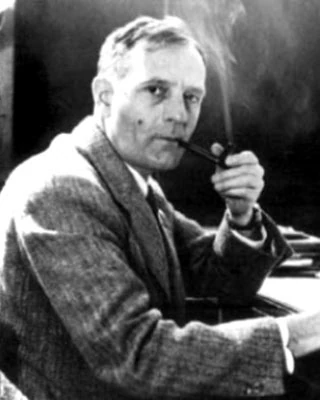
Born on November 20, 1889 in Marshfield, Missouri, Edwin Powell Hubble (1889-1953) showed early talent in both academics and sports. After brilliant high school studies, he earned a scholarship to the University of Chicago where he studied mathematics and astronomy. He particularly excelled in boxing, even becoming an amateur heavyweight champion.
After graduating in 1910, Hubble went to study law at Oxford at his father's insistence, while continuing his interest in astronomy. He returned to the United States in 1913 and briefly taught before enlisting in the army during World War I.
After the war, he earned a PhD in astronomy from the University of Chicago in 1917 with a thesis on nebulae. He then joined Mount Wilson Observatory in California, where he would spend the rest of his career.
In 1924, Hubble made a major discovery by observing the Andromeda Nebula (M31):
This discovery ended the "Great Debate" about the nature of spiral nebulae and established that our galaxy is just one among billions of others.
Hubble's most famous contribution came in 1929 when he published his observations on the redshift of galaxies:
This discovery laid the foundations for the Big Bang theory and transformed our understanding of cosmology. The constant \(H_0\) (Hubble constant) became a fundamental parameter in cosmology.
Hubble also developed a galaxy classification system still used today, known as the "Hubble sequence":
This system allows astronomers to better understand the evolution of galaxies and their distribution in the Universe.
Hubble's contributions profoundly marked modern astronomy:
In his honor, the Hubble Space Telescope (HST), launched in 1990, bears his name. He also received numerous distinctions including the Bruce Medal in 1938 and the Gold Medal of the Royal Astronomical Society in 1940.
| Discovery/Contribution | Year | Field | Scientific Impact |
|---|---|---|---|
| Discovery of the extragalactic nature of M31 | 1924 | Extragalactic astronomy | End of the Great Debate, confirmation of the existence of galaxies |
| Discovery of the Universe's expansion law | 1929 | Cosmology | Foundation of modern cosmology, basis of the Big Bang |
| Galaxy classification (Hubble sequence) | 1926 | Galactic astronomy | System still used today to classify galaxies |
| Determination of the Hubble constant | 1929 | Observational cosmology | Fundamental parameter for measuring the expansion of the Universe |
| Improvement of observation techniques | 1920-1950 | Observational astronomy | Development of long-exposure astronomical photography |